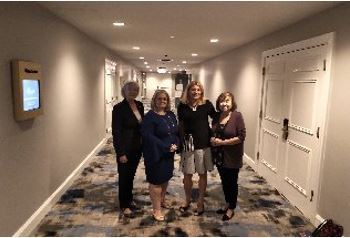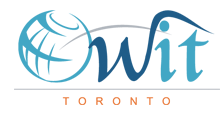
During this fall’s Toronto Global Forum, OWIT sat down with Mairead Lavery, President and CEO of Export Development Canada (EDC). During a refreshing and lively exchange, she shared her perspectives on women in trade issues and what EDC is both doing and planning for women exporters in 2020, along with her perceptions of the role of an organization like OWIT. Here are some highlights from the interview:
Q: What are some of the things EDC is doing to support women in exporting?
A: We’ve launched quite a few initiatives. For example, we created the role of Corporate Lead, Women in Trade. Jennifer Cooke is the first to hold this position, and her team ensures that the whole organization is focused on what works for women entrepreneurs, how we can encourage women to think more about exporting and how we can support their journey more. We wanted to very clearly understand their needs, to guide us on how we engage with them - whether through our website, which we adjusted to make sure it is welcoming to women entrepreneurs, more focused on their needs, clearer in terms of the support that they could access, and whether it is aligning with the collection of metrics in our business. Up to that point, we never asked our customers if they are a woman-owned
business, so understanding that also helps us do programming. Creating that baseline of data is how we got started and now we’re into the next phase – what I would call phase two of EDC’s program.
Q: What are the new initiatives geared to women that EDC is planning for 2020?
A: There are a number of things planned. An increased level of support internally tops the list so that Jennifer can do more. We will continue efforts that are working very well, including relationships with organizations like OWIT that give us the insights and access to women entrepreneurs. We’re also looking into other things that we could do differently, and contributing to more global initiatives as a leverage point to actually take women entrepreneurs international. We’ve had incredible success so far. In 2019, we announced our $50 million Women in Trade Investments Program. I sit on the committee overseeing
that fund, and the pool of customers is incredibly strong. We’re probably looking at increasing the amount of the fund because it turns out $50 million isn’t enough. Similarly, following the 2018 federal budget, we announced a goal to facilitate $250 million in trade for women-owned and -led businesses and very quickly surpassed that goal. It’s good news, but it doesn’t mean we’ve stopped. Now we need to think about adjusting and setting a new dollar volume goal for supporting women entrepreneurs’ exports and international market growth.
Q: What role is EDC playing in the government’s aggressive trade diversification strategy?
A: The majority (75%) of Canadian exports are to the US and 70% of Canadian companies export first to the US. But there are many more markets – some covered by free trade agreements – where we can encourage companies to go as well. And e-commerce is growing so rapidly that traditional thinking is quickly evolving, and people today don’t really recognize themselves in the word “exporting.” They just see themselves as doing business with customers further away than normal and they’re leveraging a tool like a logistics platform that allows them to ship their goods in small quantities. If they see
themselves as exporters, which they are, there’s a lot of room for them to grow their business and international presence. The world of exporting is changing, and all our programs are changing along with it, to try to help – whether to support diversification, progressive trade or inclusive trade.
Q: Will EDC have an increased presence internationally?
A: At the moment, we have 22 offices internationally with a plan to increase that. You’ll see an increased presence in the US because we want to encourage Canadian companies exporting there to get into supply chains that will take them further afield in the world. We continue to advance aggressively in Asia because we see the growth of the middle class and certain Canadian company strengths and capabilities that are an absolute match to the customer base in Asia. We will also go where our customers would like us to be – our London, England office is an example of that. The UK is a very important trading partner for Canada and it’s only in the last three years that we opened an office there since customers wanted us to be on the ground. In other cases, like Singapore, we establish offices in places where we believe there is good potential for Canadian companies, in order to encourage them to do business there and support them.
Q: How much presence do you have in Europe?
A: We are in London, Dusseldorf and Istanbul. Particularly because of CETA, the region is ripe for expansion so we’re evaluating whether to boost our presence. We work proactively with the Trade Commissioner Service (TCS) which has such a wide presence in the world. Canada's Minister of Small Business, Export Promotion and International Trade, Mary Ng and I have a new analogy. Minister Ng says there is no wrong door to government, and we came up with this analogy of a shopping mall. There is no wrong door into the mall because you’ll find the shop that you need and everybody is there to provide that service. That’s what the government and EDC would like to see in terms of the services that all of us in the Canadian trade ecosystem can provide to entrepreneurs. You can find us through TCS, perhaps in Paris, but you will still get to EDC in that mall because TCS will be able to reach out to us even if you don’t know about us. We’re very excited that TCS has that ability and that we can support that.
Q: Entrepreneurs often say they would like a one-stop shop to access trade support and resources. Is that feasible?
A: I think that technology is helping a great deal. However, I don’t think it’s a one-stop shop that people want or need; it’s a personalized experience because each business and its circumstances are different. I do hope that we can get them faster access through technology, but it has to be services based on their personal needs. There’s no point going into the one-stop shop if you don’t really know what you need. What we want to provide is a personalized service that recognizes your circumstance and addresses your needs because, at the end of the day, it’s about time and actually accelerating an entrepreneur’s
journey, not necessarily making everybody experts on all the services we provide.
Q: Where are the greatest opportunities for Canadian women to export?
A: It depends on their sector, where they are based geographically in Canada, their capabilities and their product. I always say: what does the customer need? It applies to entrepreneurs…where is the need for your product, or where can you create the need for your product? That’s the market to target – the one that either understands your product, doesn’t have your product, or where you can offer a superior product. Then you have to factor in other criteria, like your own capability and the life cycle of your company. The US is more attractive as a launching pad compared to Asia, where you need to be on the ground and present to be successful, which is often harder for women. I always encourage people to meet with their sector associations and have these dialogues as well.
Q: How do we increase trade for women when most of them are service providers?
A: The Canadian economy is shifting more towards service and, I think you’ll see in general, more support for service-based companies from government. Associations like OWIT, with your variety of members, can connect internationally with other bodies that have different varieties of members and make introductions for your members. Having said that, I don’t believe there is ever one network that solves all your challenges. We have to encourage women to be part of various networks where they can learn and meet others who can help. When you’re in business, you look for every advantage you can. Tailored and specific networks like OWIT are part of that advantage. Another example is trying to get into the supply chains of large organizations that are looking to diversify their supplier base. We do have to be realistic about what trade commissioners can do. Some women may have niche products or services that every trade commissioner cannot possibly be an expert in, but still, I think what they can do extremely well is introduce women to different markets and their cultures. It makes a difference when you have the support of the Government of Canada behind you when you are in foreign markets. They are a safety net and can serve as a fundamental check and balance to help you by asking questions about your export plan and why you want to enter a particular market.
Q: What role can organizations like OWIT play to combat growing protectionist sentiments in the world?
A: Organizations like OWIT that provide trade education and serve as a trusted source of very unbiased information transcend what we might read in tweets. Bringing together business leaders and letting them share trade successes and experiences that go beyond the superficial media headlines is so important. Even if you do the right things for your business, over time you can always get a shock and a country can close its doors or impose tariffs for example, but, in general, trade continues on. I think OWIT can help educate and build the confidence and be that stable and familiar face through all these
spikes. I also think that, as a grouping, you have a collective voice, and it’s getting that voice to policy makers or organizations like EDC that are thinking about what products or services to put on the market. You can actually help guide policy and product-building for your membership through your insights.
Q: Do you think gender chapters in free trade agreements are an effective way to address trade policy to make trade more inclusive for women? These chapters sound a bit aspirational now. What needs to happen next?
A: I will speak as a practical business person on how to get things done, and generally things done by measurement. You measure what matters. If it truly matters, then measurements are put in place to determine if success is achieved. That’s what it takes in business and I don’t think this would be any different. You say that the dialogue between OWIT and government has been greater in the last few years than the previous 20. I see that as a positive step and would encourage you to continue to reach out with your recommendations to the policy people who are negotiating agreements.



